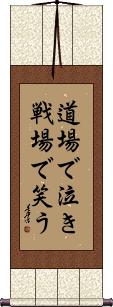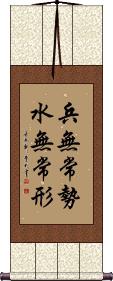Many custom options...
And formats...

Battlefield in Chinese / Japanese...
Buy a Battlefield calligraphy wall scroll here!
Personalize your custom “Battlefield” project by clicking the button next to your favorite “Battlefield” title below...
Cry in the Dojo - Laugh on the Battlefield
道場で泣き戦場で笑う is a Japanese phrase that means “Cry in the dojo, laugh on the battlefield.”
You'll see this phrase in a lot of dojos as a kind of philosophical joke.
Note: Because this selection contains some special Japanese Hiragana characters, it should be written by a Japanese calligrapher.
See Also: The More We Sweat in Training the Less We Bleed in Battle
Shinken Shobu
Death Match
In modern Japanese, 真剣勝負 means to take something very seriously.
The literal and historical meaning is “real sword battle.” In old times, a Samurai apprentice would practice with a wooden practice sword. Once trained and qualified, they would wield a real steel sword made for battle and killing. They were ready for a “death match” or Shinken Shobu.
真剣 is an adjective that has come to mean serious/earnest. The literal translation is “real sword.”
勝負 in the simplest terms, means match, contest, game, or bout. Depending on the context, it could also mean victory or defeat, winning and losing, or the outcome of a battle.
There is a suggestion in Shinken Shobu that you train with serious and real intent, as we should train with the same fervor and dedication as if the battle was real. “Train as we fight.”
See Also: The More We Sweat in Training the Less We Bleed in Battle
Warriors Adapt and Overcome
Soldiers need a fluid plan
This literally translates as: Troops/soldiers/warriors have no fixed [battlefield] strategy [just as] water has no constant shape [but adapts itself to whatever container it is in].
Figuratively, this means: One should seek to find whatever strategy or method is best suited to resolving each individual problem.
This proverb is about as close as you can get to the military idea of “adapt improvise overcome.” 兵無常勢水無常形 is the best way to express that idea in both an ancient way, and a very natural way in Chinese.
Not the results for battlefield that you were looking for?
Below are some entries from our dictionary that may match your battlefield search...
| Characters If shown, 2nd row is Simp. Chinese |
Pronunciation Romanization |
Simple Dictionary Definition |
阿修羅 阿修罗 see styles |
ā xiū luó a1 xiu1 luo2 a hsiu lo ashura; asura あしゅら; あすら |
More info & calligraphy: Frightful Demon / Asura{Buddh} Asura; demigod; anti-god; titan; demigods that fight the Devas (gods) in Hindu mythology; (female given name) Ashura asura, 修羅 originally meaning a spirit, spirits, or even the gods, it generally indicates titanic demons, enemies of the gods, with whom, especially Indra, they wage constant war. They are defined as 'not devas', and 'ugly', and 'without wine'. Other forms are 阿須羅 (or 阿蘇羅, or 阿素羅); 阿修倫 (or羅須倫 or 阿修輪 or 羅須輪); 阿素洛; 阿差. Four classes are named according to their manner of rebirth-egg, born, womb-born, transformation-born, and spawn- or water-born. Their abode is in the ocean, north of Sumeru, but certain of the weaker dwell in a western mountain cave. They have realms, rulers, and palaces, as have the devas. The 阿修羅道 is one of the six gatis, or ways of reincarnation. The 修羅場 or 修羅巷 is the battlefield of the asuras against Indra. The 阿修羅琴 are their harps. |
井楼 see styles |
seirou / sero せいろう |
wooden watchtower; battlefield watchtower |
収骨 see styles |
shuukotsu / shukotsu しゅうこつ |
(n,vs,vt,vi) (1) collecting bones and remains (e.g. on a battlefield); (n,vs,vt,vi) (2) putting cremated remains in an urn |
戦域 see styles |
seniki せんいき |
{mil} war area; battlefield; theater; theatre |
戦場 see styles |
senjou(p); ikusaba / senjo(p); ikusaba せんじょう(P); いくさば |
battlefield; battleground; (surname) Senba |
戦跡 see styles |
senseki せんせき |
old battlefield |
戦野 see styles |
senya せんや |
battlefield |
戦陣 see styles |
senjin せんじん |
battle array; battle formation; battlefield |
戰地 战地 see styles |
zhàn dì zhan4 di4 chan ti |
battlefield |
戰場 战场 see styles |
zhàn chǎng zhan4 chang3 chan ch`ang chan chang |
battlefield; CL:個|个[ge4] |
戰況 战况 see styles |
zhàn kuàng zhan4 kuang4 chan k`uang chan kuang |
battlefield situation; battle progress |
敗陣 败阵 see styles |
bài zhèn bai4 zhen4 pai chen |
to be defeated on the battlefield; to be beaten in a contest |
樓櫓 楼橹 see styles |
lóu lǔ lou2 lu3 lou lu |
watch tower; movable battlefield turret |
沙場 沙场 see styles |
shā chǎng sha1 chang3 sha ch`ang sha chang |
sandpit; battleground; battlefield |
疆場 疆场 see styles |
jiāng chǎng jiang1 chang3 chiang ch`ang chiang chang |
battlefield |
血田 see styles |
xuè tián xue4 tian2 hsüeh t`ien hsüeh tien |
field of blood; battlefield; hateful place; Aceldama (field bought by Judas Iscariot with his 30 pieces of silver in Matthew 27:7) |
血路 see styles |
xuè lù xue4 lu4 hsüeh lu ketsuro けつろ |
desperate getaway (from a battlefield); to cut a bloody path out of a battlefield way out; means of escape |
軍場 see styles |
ikusaba いくさば |
(See 戦場) battlefield; battleground; (surname) Gunba |
軍陣 军阵 see styles |
jun zhèn jun1 zhen4 chün chen gunjin ぐんじん |
battle formation camp; battlefield |
転戦 see styles |
tensen てんせん |
(n,vs,vi) moving from one battlefield to another; fighting on successive fronts; fighting in various battles |
野戦 see styles |
yasen やせん |
(1) {mil} field battle; field operations; open battle; (2) battlefield; battlefront |
野戰 野战 see styles |
yě zhàn ye3 zhan4 yeh chan |
battlefield operation; paintball |
闘場 see styles |
toujou / tojo とうじょう |
battlefield; battleground |
鼓譟 see styles |
kosou / koso こそう |
(noun/participle) (1) (obscure) motivating the troops on the battlefield with war drums and war cries; (2) (obscure) making an uproar |
鼓騒 see styles |
kosou / koso こそう |
(noun/participle) (1) (obscure) motivating the troops on the battlefield with war drums and war cries; (2) (obscure) making an uproar |
主戦場 see styles |
shusenjou / shusenjo しゅせんじょう |
(1) main theater of war; principal battlefield; (2) main market; principal area of competition |
修羅場 修罗场 see styles |
xiū luó chǎng xiu1 luo2 chang3 hsiu lo ch`ang hsiu lo chang shuraba; shurajou(ok) / shuraba; shurajo(ok) しゅらば; しゅらじょう(ok) |
(1) fighting scene; scene of carnage (bloodshed); (2) (しゅらじょう only) (See 阿修羅・あしゅら,帝釈天・たいしゃくてん) location of the fight between the Asuras and Shakra; (3) (しゅらば only) (colloquialism) difficulties (in a love relationship); (4) (しゅらば only) (colloquialism) crunch time (esp. for cartoonists) lit. battlefield of asuras |
修羅軍 修罗军 see styles |
xiū luó jun xiu1 luo2 jun1 hsiu lo chün shura no ikusa |
The army of asuras, fighting on the 修羅場 asura battlefield against Indra. |
古戦場 see styles |
kosenjou / kosenjo こせんじょう |
ancient battlefield; (place-name) Kosenjō |
第一線 第一线 see styles |
dì yī xiàn di4 yi1 xian4 ti i hsien daiissen / daissen だいいっせん |
front line; forefront the front (of a battlefield); forefront |
Click here for more battlefield results from our dictionary
The following table may be helpful for those studying Chinese or Japanese...
| Title | Characters | Romaji (Romanized Japanese) | Various forms of Romanized Chinese | |
| Cry in the Dojo - Laugh on the Battlefield | 道場で泣き戦場で笑う | doujou de naki senjou de warau dojo de naki senjo de warau | ||
| Shinken Shobu | 真剣勝負 | shinken shoubu shinkenshoubu shinken shobu | ||
| Warriors Adapt and Overcome | 兵無常勢水無常形 兵无常势水无常形 | bīng wú cháng shì shuǐ wú cháng xíng bing1 wu2 chang2 shi4 shui3 wu2 chang2 xing2 bing wu chang shi shui wu chang xing | ping wu ch`ang shih shui wu ch`ang hsing ping wu chang shih shui wu chang hsing |
|
| In some entries above you will see that characters have different versions above and below a line. In these cases, the characters above the line are Traditional Chinese, while the ones below are Simplified Chinese. | ||||
Successful Chinese Character and Japanese Kanji calligraphy searches within the last few hours...






